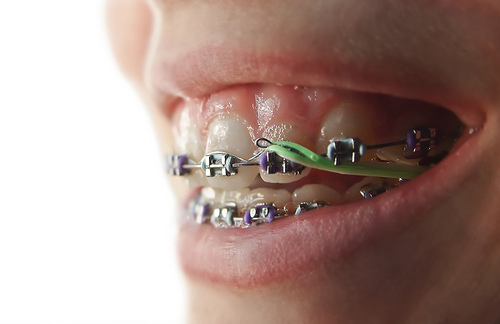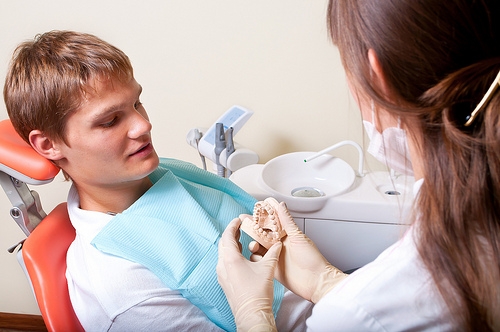August 1st, 2018

Most people think braces are all about their teeth. While it is true orthodontics is meant to move your teeth into proper position, there's more to it than that. To safely move your teeth with braces, you're going to need healthy and stable gums (or periodontium—the tissues that support your teeth).
For this reason it's critical to have your periodontal health evaluated prior to getting braces. This applies particularly to adults, since a 2013 study by the Center For Disease Control found that an estimated 47.2% of adults 30 years of age and older had periodontitis (gum disease). If you do have periodontitis, moving your teeth with braces will only make things worse.
Conversely, there is also risk for periodontal disease if you don't get orthodontic treatment. Malocclusion, as well as crooked and spaced teeth, can all contribute to periodontal disease. In these situations your teeth and gums are more difficult to clean and become breeding grounds for disease causing bacteria. Bad oral hygiene combined with these traits can greatly contribute to the development of periodontitis.
So, periodontics and braces have a tricky relationship. On one hand, you shouldn't get braces if you show signs of developing or have periodontitis, while on the other hand, braces can help prevent the possibility of developing periodontitis by correcting the bite and straightening the teeth.
If you are 30 years of age or older and are considering getting braces, it would be wise to first:
- Let Dr. Schmidtke know about your desire to get braces
- Get an exam to make sure you're in good periodontal health and a good candidate for braces
- If you are a good candidate, keep an eye on your teeth and gums and get regular dental checkups throughout your entire course of treatment.
If you are in any doubt about the status of your teeth and gums, it's always best to get them checked before embarking with braces treatment. For more information or to have your periodontal health assessed for braces treatment, please contact our Hortonville or Appleville office.
July 25th, 2018

Most of our patients at Schmidtke Orthodontics will need to wear rubber bands at some point during their orthodontic treatment. The main reason our patients are instructed to wear rubber bands is to correct their bite. If your teeth do not fit together properly, Dr. Schmidtke will recommend that rubber bands be used. Dr. Schmidtke may also recommend using rubber bands to close or open spaces.
Rubber bands are a critical part of your treatment, and wearing them as Dr. Schmidtke and our team recommend will help move your teeth into the desired position. Dr. Schmidtke may ask you to wear your rubber bands full time, meaning that they should only be taken out when you brush and floss your teeth three times a day. Other times, you may be asked to only wear them part-time, like only during the day or only during sleep.
If you still have any questions about orthodontic rubber bands, we invite you to give us a call or ask us during your next adjustment appointment. Remember, wearing rubber bands as prescribed by Dr. Schmidtke is an important step during your treatment, and can reduce the time you have your braces. If you lose your rubber bands or run out, stop by our Hortonville or Appleville office and pick up more!
July 18th, 2018

This is one of the most common questions that is asked at Schmidtke Orthodontics and, unfortunately, it does not have a simple answer. Just as every patient we see is unique, so is their treatment plan. Some patients have very simple problems which require less appliances and time, while other cases are much more complicated and may require multiple appliances and phases.
The treatment fee usually reflects the amount of orthodontic work required to complete the treatment plan. The only way to find out how much braces will cost is to schedule a consultation with Dr. Schmidtke. During your consultation, we will perform a complete oral examination, listen to your concerns, and explain how we will address your needs.
Our findings will include the cost of orthodontics and how long the treatment will take to complete. Give us a call today at our convenient location in Hortonville or Appleville for a consultation and discover how quickly we can make you smile!
July 11th, 2018

You've made an investment on spending money on getting braces, so why not keep your teeth in good health while undergoing orthodontic treatment? Dr. Schmidtke and our team at Schmidtke Orthodontics will tell you it is just as important to develop a regular hygiene routine while you're wearing braces as you did before proceeding with treatment.
Flossing is essential to the health of your teeth and gums when you're wearing braces. Because braces may hold food, sugars and liquids upon eating, it is very important to keep on top of your brushing and flossing, as well as visiting our office for regular adjustments.
While we know it's tough enough to get kids to floss daily without braces, that battle becomes even tougher when braces are involved. Remember that by not flossing, you will become more prone to cavities and gum disease during your treatment.
When flossing, remember to gently massage your gums in between the teeth. You will find that flossing with braces takes extra time, as you will have to weave the floss through each bracket. When flossing, there should be no signs of blood. If you see blood, you are not flossing enough or properly.
Using an electric toothbrush is also a good idea to massage your gums before or after flossing as electric toothbrushes can help remove any harmful bacteria that are lingering in your mouth. And don't forget to add a mouthwash to your routine to break up any bacteria that has formed. A good mouthwash will help keep your teeth and gums in good shape during your treatment.
If you have any questions about flossing or your orthodontic treatment at Schmidtke Orthodontics please don't hesitate to give us a call or during your next adjustment appointment!




